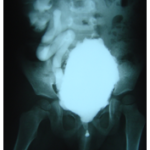What is Neurogenic Bladder (NB)?
NB is a term used, for a dysfunctional lower urinary tract, due to causes other than primary urinary tract pathology.
What happens in normal conditions?
Except in infants and small children, who have automatic & involuntary passing of urine, the act of passing urine is completely voluntary. Urination is initiated when a person wants to pass urine and can be controlled if the situation is not conducive. This passing of urine should be free, without the need to strain, and each time should empty the bladder. When the bladder keeps filling, the sphincters tighten and prevent leak of urine. When the bladder contracts to empty, the sphincters open to let urine out. These work in an extremely coordinated manner. Any condition other than this, any involuntary leak of urine, or difficulty to urinate is abnormal and needs evaluation. Difficulty to pass urine, or leaking of urine can be a major social handicap or nuisance to others.
The passing of urine or controlling urination is under the control of the central nervous system. Messages from the brain are sent through the spinal cord and the lumbar and sacral nerves to the bladder and sphincters. If for any reason the spinal cord or its nerves are damaged, or the normal functioning of the brain itself is affected, this control is lost. The bladder may then lose sensation, and fail to empty, or may overwork; the sphincter may or may not open appropriately.
What conditions cause NB?
Diseases such as Parkinson’s, Alzheimer’s, multiple sclerosis, large cerebral hemorrhage, dementia, spinal cord injury /tumors/transverse myelitis, or injury to the nerves by surgery, diabetes mellitus, etc., may all cause a neurogenic bladder.
How do they present?
Such patients present with one or more of the following signs and symptoms:
Retention of urine, inability to control urination (frequency, urgency), urine incontinence, loss of bladder sensation, etc. Disturbance of bowel control is also very common. These are in addition to the general symptoms of neurological injury such as coma/paralysis etc.
While the physical disabilities may seem very frightening, they are usually not life-threatening. But bladder dysfunction, while not very overt, is usually the cause of severe morbidity, renal failure, and even mortality. It is often neglected due to lack of awareness of its ill effects.
What are the investigations required?
The clinical diagnosis of a neurogenic bladder is made on the basis of certain simple and preliminary tests such as urine analysis, an ultrasound evaluation, MCU (micturating cystourethrogram) wherein contrast filled in the bladder and x-ray films are taken; urodynamic test in which bladder pressures and activities of the sphincters are measured during filling and voiding phase and this test will allow us to further plan his/her treatment. An MRI of the spine (see the picture below) or brain is required to look any cause in the nervous system.
How is neurogenic bladder treated?
The focus in managing a neurogenic bladder is to prevent renal damage. Renal damage occurs due to intolerably increased pressures in the bladder, causing backpressure effect on the kidneys, resulting in their slow damage without symptoms in the early stages. They also develop a urine infection, stones etc. All treatment will, therefore, be aimed to reduce these bladder pressures.
The treatment options will be decided after urodynamic study.
The simplest of treatment would be to teach patients to pass a catheter themselves, every 4-6 hours, depending upon the urine volumes, to keep the bladder empty and also prevent incontinence.
Medicines are also used to reduce the pressures in the bladder. Generally, the tablets will need to be taken for a lifetime, till alternative therapies can be instituted.
Surgery: is done either to reduce the pressures in a bladder by adding other body tissues with an increase of capacity, or by way of inserting an artificial sphincter to prevent a constant leak of urine. Surgery is resorted to only if all other measures have failed.
Management of neurogenic bladder must include bowel management also, as an integral part of the treatment. This may include a change in the dietary fiber, enemas, and laxatives.
Frequently asked questions
Urine shows plenty of pus cells and urine culture is positive?
No need to worry and no treatment is required unless you have a fever.
Is there a role for Botox?
Injection of Botox is given to sphincter in those who have sphincter dysfunction (Detrusor-sphincter dyssynergia) or into the bladder in those with overactive bladder not responding to anticholinergics.

